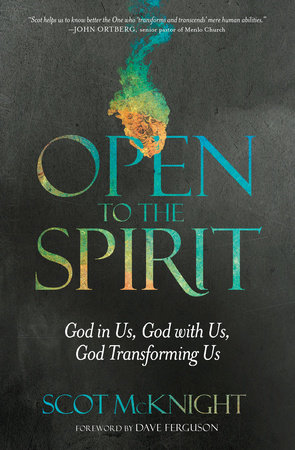Scot McKnight: Open to the Spirit
 Scot McKnight, Open to the Spirit: God in Us, God with Us, God Transforming Us (New York: Waterbrook, 2018), ISBN 9781601426345.
Scot McKnight, Open to the Spirit: God in Us, God with Us, God Transforming Us (New York: Waterbrook, 2018), ISBN 9781601426345.
New Testament scholar Scot McKnight is not your typical seminary professor with a doctorate from the University of Nottingham. Whereas many scholars focus on writing for the academy, or on technical commentaries for seminary-educated pastors, a great number of McKnight’s more than eighty books are written for believers in the pews and ministers who haven’t had the opportunity to obtain an advanced degree. McKnight is a biblical scholar with his feet firmly planted in the local church, serving as a deacon in the Anglican Church in North America. His theology is not theoretical, but rather practical, boots-on-the-ground application of biblical truth. According to McKnight’s introduction to the book, the central idea of Open to the Spirit is “God is alive and well and indwells us. And God wants to transform us into persons who demonstrate the grace, love, peace, and justice of God.” It doesn’t get much more practical than that.
The book is divided into five major sections
- Open to the God Who Speaks
- Open to the New Creation of the Spirit
- Open to the People of the Spirit
- Open to the Virtues of the Spirit
- Open to the Victory of the Spirit
Whereas with other books having chapters of 30 to 40 pages (or more) one often has to split the reading on one topic over several reading sessions, McKnight’s 24 chapters max out at ten pages long, making it easy to read each chapter in a single sitting (possibly as part of one’s daily devotions) and meditate on the thoughts presented in easily-digestible portions.
“We need the Spirit to empower us to live as God wants us to live.” —Scott McKnight
Whereas many theologies (especially systematics textbooks) start out with the doctrine of Scripture, McKnight presents his chapter on being open to the God who speaks in the living Word before his chapter on God speaking through the written Word. This keeps the person of Christ at the forefront. The fourth chapter deals with the God who speaks through prophetic words, and states unequivocally that “to deny the gift of prophecy in the church s to quench the Spirit.” The fifth chapter closes out the first section with a discussion of the Spirit who intercedes for and through believers.
The book’s second section, “Open to the New Creation of the Spirit,” discusses what it means for the Spirit to bring about new life in us. This new life requires our participation and cooperation. McKnight makes it clear that “we are not filled with the Spirit accidentally. No, we must seek the Spirit’s filling, we must request the Spirit’s filling, and we must receive the Spirit’s filling” (pp. 60-61). While McKnight argues that there is only one baptism (and recognizes that Pentecostals and Charismatics may balk at this statement), he does say that based on personal experience and the testimony of other Christians that there is still a need for ongoing and fresh fillings of the Spirit. (In my own personal analysis, I have found it prudent not to get into debates about terminology such as “baptism,” “empowerment,” or “filling,” as long as people recognize the need for the ongoing supernatural work of the Spirit. Rather than debating semantics, let’s simply agree that we can’t live as God desires without the Spirit moving in our lives.)
It is only the work of the Spirit that can draw together a vast array of unique individuals, from diverse backgrounds and with distinct giftings, and cause them to function as one body animated by the divine breath.
The fourth section has chapters dealing with assurance, freedom, and holiness, which McKnight point out is “first and foremost devotion to God,” with rejecting the world being an outflow of that God-centered devotion, rather than the driving force in the Christian life (p. 149). This section gets into the down-to-earth, day-to-day aspects of Christian living where the Spirit empowers transformation.
Open to the Spirit would be a great introduction to the work of the Holy Spirit for someone who is open and curious.
In conclusion, I believe Open to the Spirit would be a great introduction to the work of the Holy Spirit for someone who is open and curious, but not ready for a more academic study. It is easy to understand, avoiding difficult and obscure theological terminology in favor of simple language that is accessible. Since it is not a classical apologetic for the continuationist position, but rather a simple explanation of why one should be open to what the Spirit wants to do in the Christian’s life, it is an ideal book to give to someone who may have reservations about the charismata but is willing to go where the scriptural evidence leads.
Reviewed by Brian Roden
Preview: https://www.google.com/books/edition/_/1pJPDwAAQBAJ
Publisher’s page: https://www.penguinrandomhouse.com/books/236744/open-to-the-spirit-by-scot-mcknight-foreword-by-dave-ferguson/
Category: Spirit, Spring 2022


